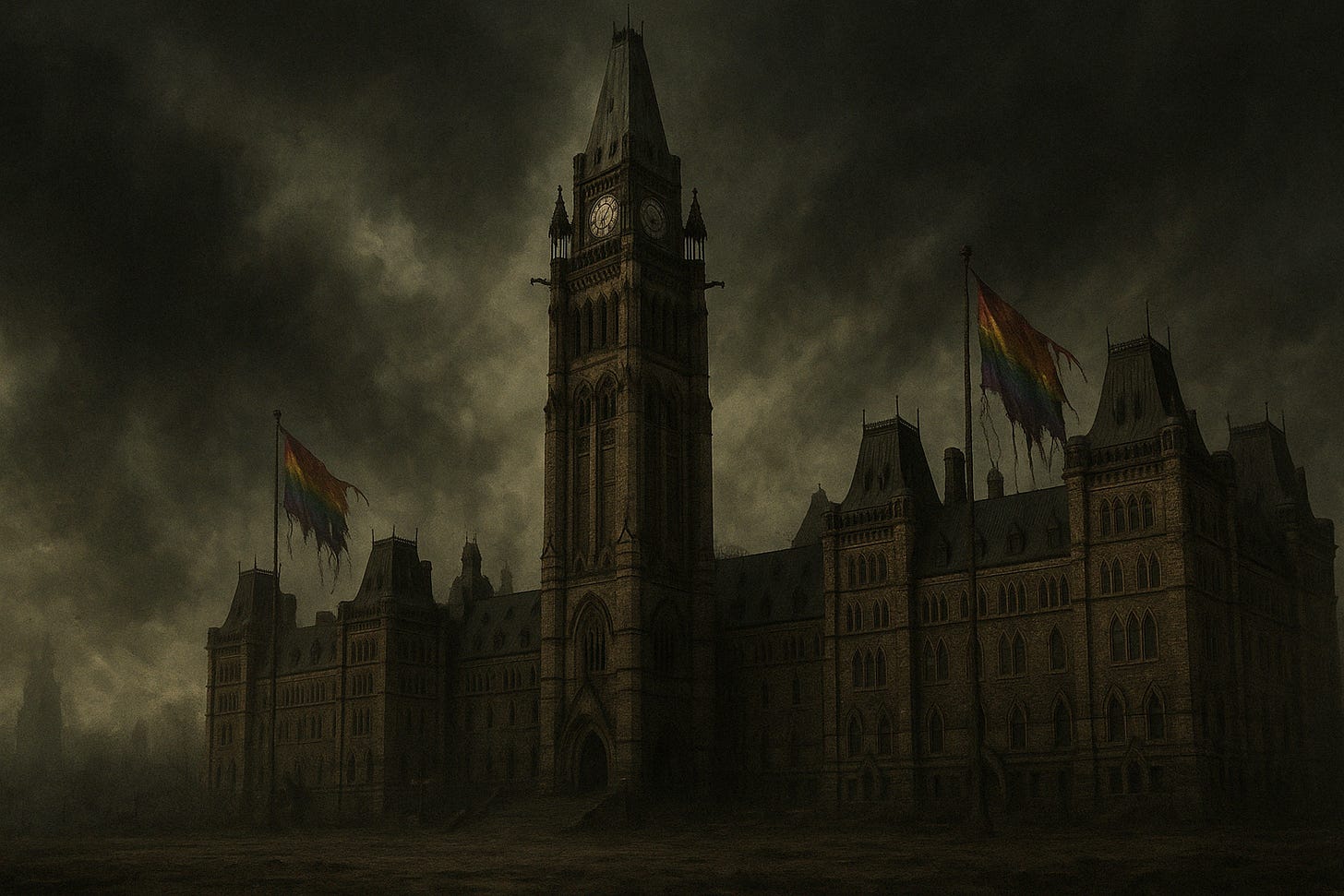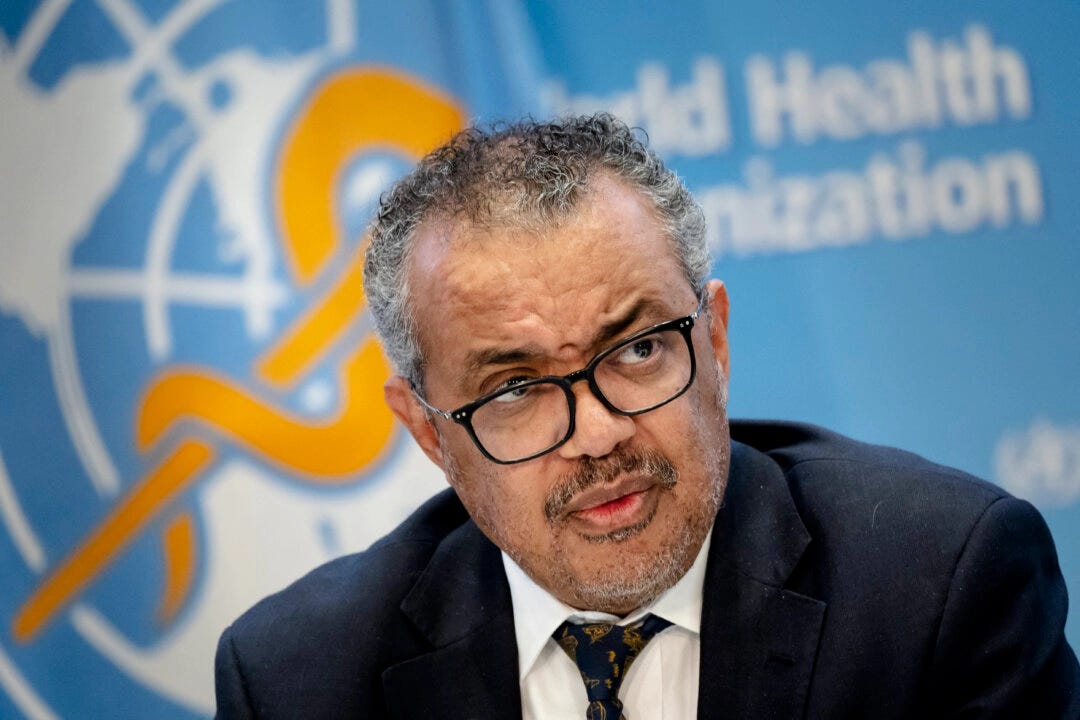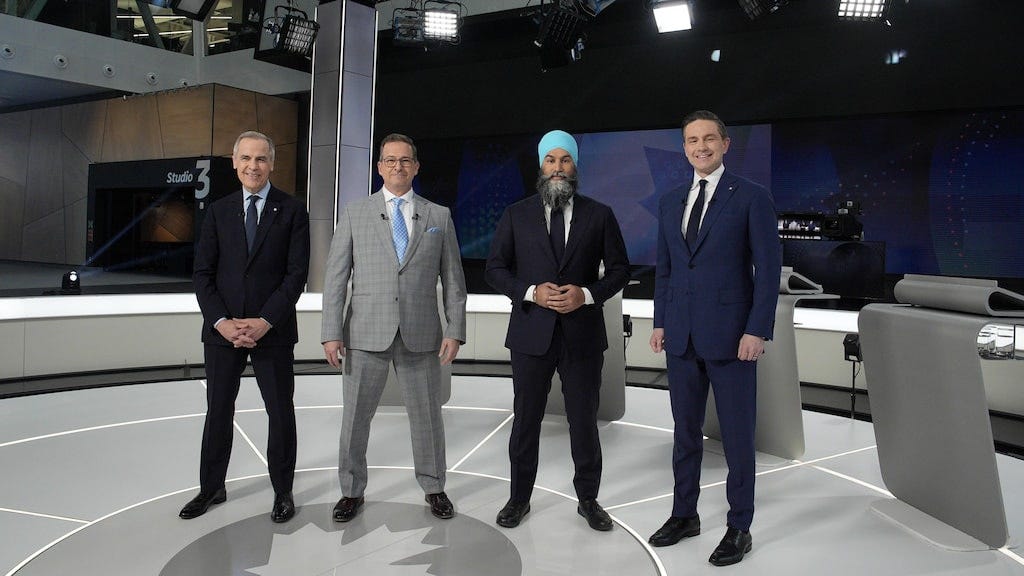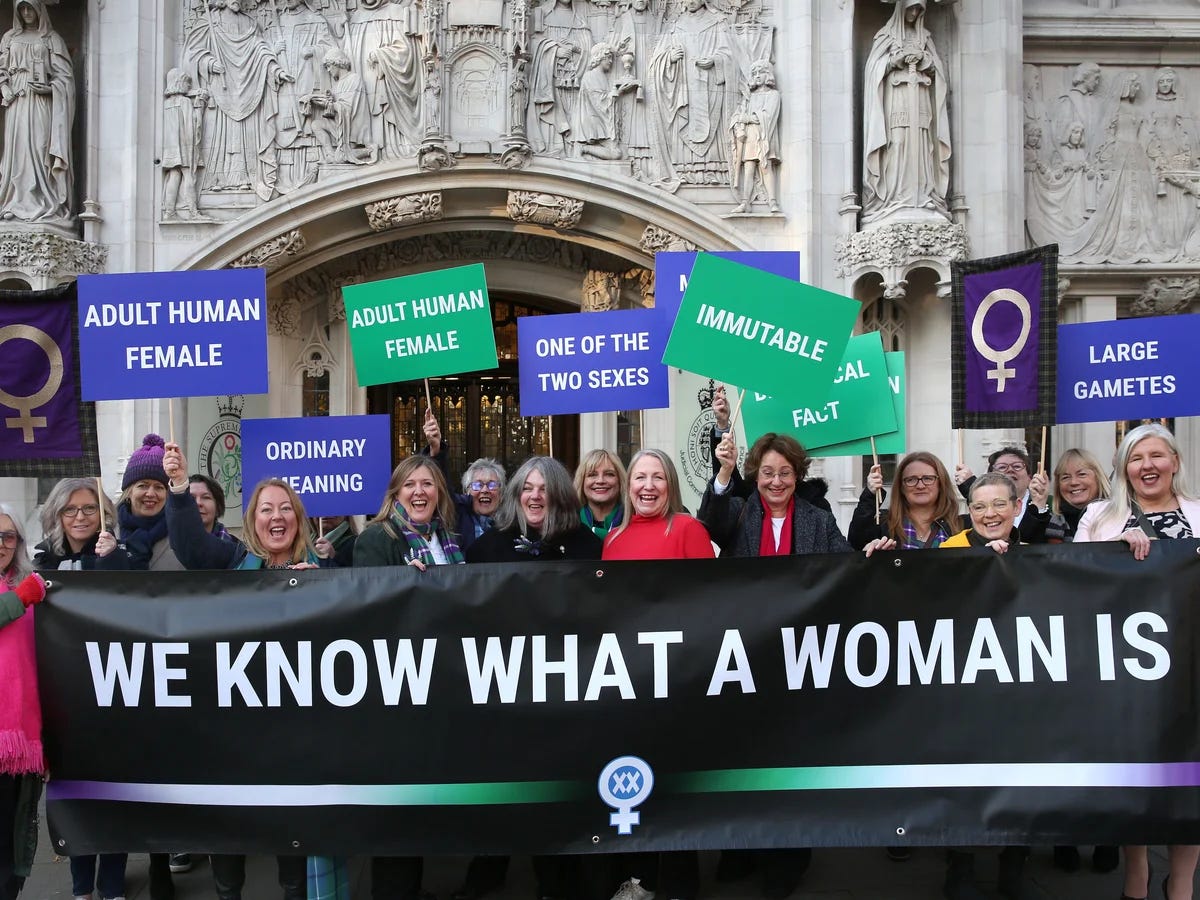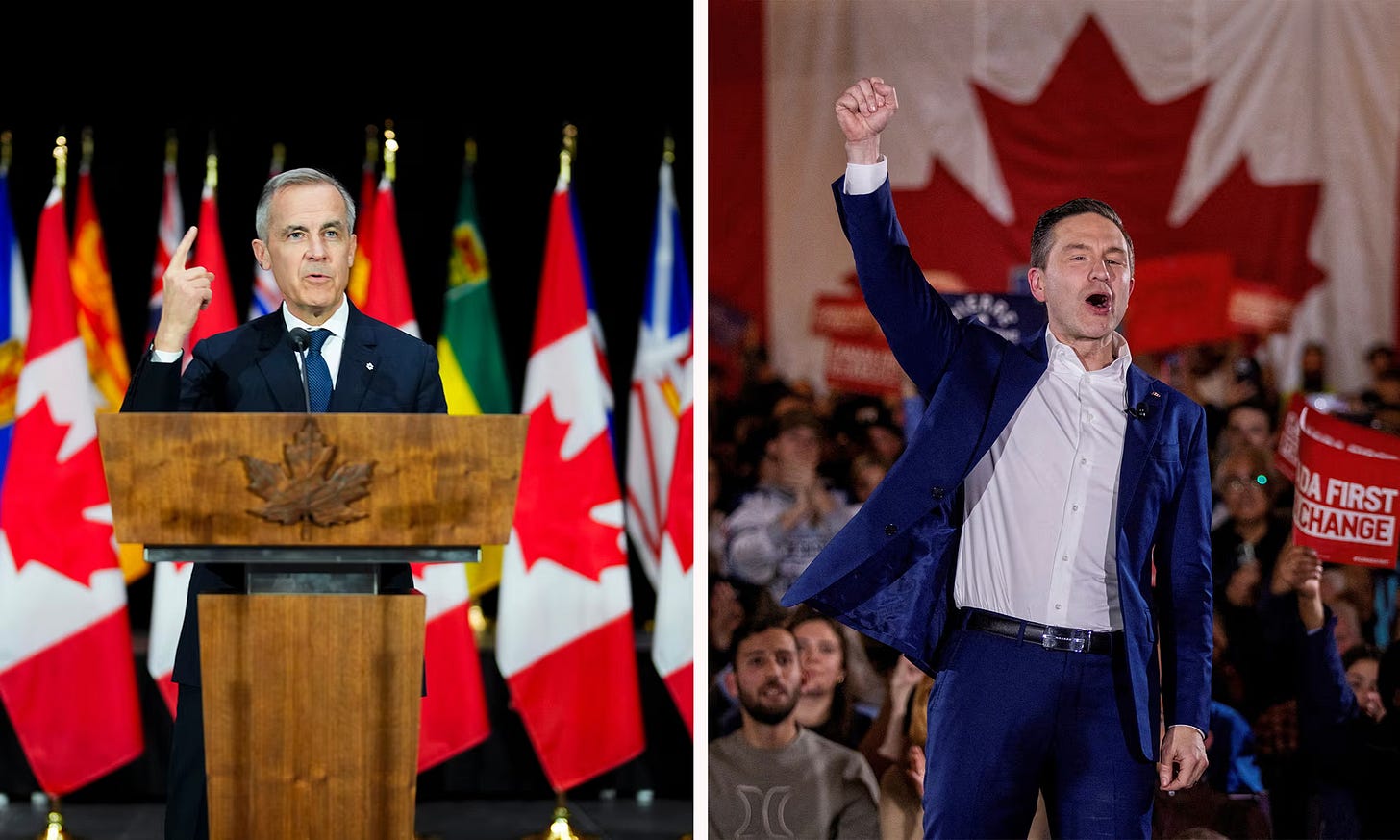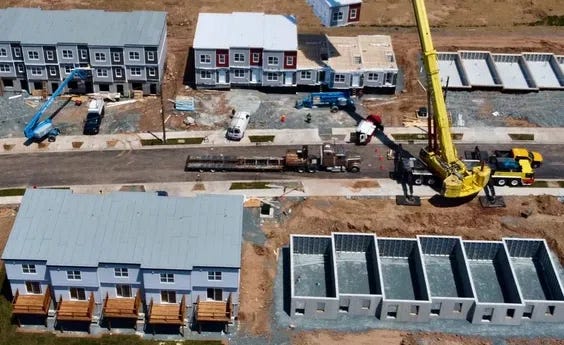Good morning, It’s Thursday, April 17th. In today’s news, a Department of Finance report reveals our tax system penalizes white male Canadians, the WHO tries to sell a new “pandemic agreement,” Federal Party leaders take each other on in a french debate, UK supreme court throws a wrench in gender ideology, and much more.
First time reading the daily blend? Sign up here.
Canada’s Tax System Is Engineered to Penalize White Male Canadians
According to the Government of Canada’s own data, recent immigrants receive 205% more in Canada Child Benefits than people born in Canada. That’s not speculation—that’s from the 2025 Report on Federal Tax Expenditures. And it lines up perfectly with both the UN’s plan for “replacement migration” and Justin Trudeau’s 2016 speech at the World Economic Forum, where he called Syrian refugees “the future of the Canadian economy.” It wasn’t a metaphor. It was a business plan.
The same report shows that Canada’s tax system reduces the income gap between Indigenous and white Canadians by $4,500, and between racialized people and white Canadians by $3,000. This isn’t just virtue signalling—this is state-engineered wealth redistribution that openly tracks how much money is being taken from one race and handed to another. And let’s be clear: white Canadians aren’t even the highest earners. South Koreans, Chinese, and South Asians top the income ladder. So why is the system designed specifically to redistribute wealth from white people?
This is what “equity” really means in practice: punishing people based on race and sex, not need.
Consider this: trans women and non-binary individuals receive 1,343% more in child benefits than men. Women receive 3,157% more. Meanwhile, men pay 66% of all federal personal income taxes, while women pay just 34%. And yet, if you’re a man raising kids in this country, the only way to get child benefits is to throw on a dress and declare yourself a woman.
Feminism claimed it was about independence. But what did it actually create? A system where 38% of marriages end in divorce—often initiated by women—and the government takes on the role of provider. A government that is funded by money primarily taken from men.
These points aren’t even being made out of concern for men specifically. The larger issues is that this model inevitably leads to societal collapse. Nearly 1 in 4 Canadians are food insecure. Half the population is financially paralyzed. An entire generation has been priced out of homeownership. This doesn’t lead to liberation for women or justice for minorities. It leads to economic serfdom.
Canadians should never have to hear another politician babble about “white privilege” or the “patriarchy.” We are past that. This is economic sabotage dressed up as morality.
As Margaret Thatcher warned: “The problem with socialism is that you eventually run out of other people’s money.”
The WHO’s New “Pandemic Agreement” Is Nothing But a Power-Hungry Paper Tiger
Five years after its disastrous handling of COVID-19, the World Health Organization (WHO) is back with a new so-called “pandemic agreement.” It’s being sold as a global step toward pandemic preparedness, cooperation, and equity. But beneath the press statements, lies a familiar story: more bureaucracy, no accountability, and a glaring refusal to learn from past failures.
On April 15, 2025, the WHO announced that its member states had reached a consensus on a new pandemic accord, with final adoption expected in May. WHO Director-General Tedros Adhanom Ghebreyesus praised the deal as evidence “that multilateralism is alive and well” and claimed it would make the world “safer.” But given the WHO’s track record during COVID-19—when it downplayed the virus’s severity, parroted Chinese Communist Party talking points, and stumbled through conflicting health guidance—this agreement deserves deep scrutiny.
A Bureaucratic Facade Masquerading as Reform
Here are the key components of the new WHO pandemic agreement—most of which raise more questions than confidence:
Pathogen Access and Benefit-Sharing (PABS) System: Under this agreement, countries that share virus samples are promised access to any resulting tests, vaccines, or treatments. The WHO would retain up to 20% of these medical products to redistribute to poorer nations. But the logistics, enforcement, and fairness of such a system are still vague and subject to ongoing negotiations (AP News).
Global Supply Chain and Logistics Network: A proposal to establish a supply system that can rapidly distribute medical resources during future pandemics. While noble in theory, its execution hinges on the same organization that failed to coordinate PPE distribution and vaccine equity during COVID-19 (Reuters).
Conference of the Parties (COP): A review body will be created to monitor implementation every three years. But the agreement has no real enforcement power—relying on voluntary compliance, which proved utterly useless when countries like China concealed early COVID-19 data and faced zero repercussions (The Lancet).
Sovereignty Clauses: The WHO claims the agreement will not override national laws or allow it to impose lockdowns, travel bans, or vaccine mandates. But given the WHO’s COVID-era behavior and its deep ties to authoritarian governments, this language offers little comfort.
A Track Record of Failure—and No Accountability
Before handing any authority to the WHO, we must not overlook its deeply flawed performance during COVID-19. While the virus spread in Wuhan, WHO leadership heaped praise on the Chinese government for its “transparency,” despite mounting evidence of data suppression and whistleblower silencing. The organization waited far too long to declare a pandemic and repeatedly contradicted itself on masks, border controls, and vaccine recommendations.
The new agreement includes zero provisions for independent investigations into outbreak origins. This omission alone makes the document a non-starter for any serious public health authority. Without mandatory data sharing and transparency, how exactly is the world “safer”?
The US has already pulled out of the negotiations under President Trump’s directive, calling WHO a politically compromised and “harmful organization,” and rightly so. Argentine President Javier Milei echoed the sentiment, calling the WHO the “executing arm” of the largest global social-control experiment in history.
The Real Motive: Power Preservation
This agreement isn’t about protecting people. It’s about protecting the WHO’s relevance. Faced with global criticism and growing skepticism, the organization is scrambling to justify its existence. The language of equity, cooperation, and “common but differentiated responsibilities” sounds good on paper, but in practice it’s vague, unenforceable, and ripe for exploitation by authoritarian regimes and unaccountable bureaucrats.
Even now, the WHO has not implemented meaningful reforms. It hasn’t held China accountable. It hasn’t apologized for its early COVID-19 missteps. It hasn’t improved its transparency or independence. Instead, it’s positioning itself to play a central role in the next pandemic—without any real check on its power or scrutiny of its failures.
French Debate Turns Heated as Leaders Trade Blows Over Trump, Pipelines, and Tax Havens
The first French-language federal election debate took place in Montreal, where Liberal Leader and current Prime Minister Mark Carney faced off against Conservative Leader Pierre Poilievre, NDP Leader Jagmeet Singh, and Bloc Québécois Leader Yves-François Blanchet in a spirited two-hour exchange that covered major issues like affordability, climate policy, foreign affairs, and immigration. The event, rescheduled to avoid clashing with a crucial Montreal Canadiens playoff game, featured both fiery attacks and moments of levity as leaders vied for Quebec’s francophone vote.
Carney, newly appointed prime minister in March following Justin Trudeau’s resignation, was frequently on the defensive, particularly over his ties to offshore tax shelters through Brookfield Asset Management and his perceived detachment from average Canadians—highlighted when he admitted during the Liberal leadership race that he doesn’t buy his own groceries. Singh and Blanchet each accused him of being elitist and out of touch. Singh further criticized Carney for prioritizing ceremonial appearances, such as meeting King Charles, over helping Canadian families.
Poilievre targeted Carney throughout, accusing him of being central to the "lost Liberal decade" under Trudeau and of failing to stand firm against U.S. President Donald Trump. In contrast, Poilievre presented himself as tough on trade, fiscally responsible, and firmly in favor of pipeline development and nuclear energy, while opposing the Liberals’ electric vehicle mandate. Carney tried to walk a middle line—supporting pipelines but only with local and Indigenous consent—while Singh pushed for more investment in clean energy.
All leaders dodged questions about their costed platforms, promising transparency only after the debates. Blanchet mocked their promises as “Harry Potter budgets,” noting they relied on magical thinking: increasing spending while pledging tax cuts.
The debate also touched on foreign policy flashpoints, particularly the Israel-Hamas conflict. Poilievre vowed to defund UNRWA due to alleged Hamas ties, a statement Singh called “disgusting.” Carney sought a more diplomatic stance, criticizing the use of the word “genocide” as overly politicized.
A final moment of tension came when Singh accused moderator Patrice Roy of bias after repeated interruptions. Roy denied any unfair treatment, and Singh later walked back the accusation.
With early voting set to begin and Quebec’s 78 seats in play, the debate may prove consequential—particularly for Carney’s Liberals, who currently lead in the province. Source.
Pierre Poilievre vs Corruption, Carney Attacks Free Speech, & COVID Cover Up | Blendr Report EP103
In this episode of the Blender Report, we talk about:
Liberal Election Interference in Canada’s 2025 Race
Mark Carney’s Roadmap to Online Censorship
The COVID Cover-Up
Poilievre Unveils 'Accountability Act 2.0' to Crack Down on Corruption
Canada’s Tax Collectors Acting More Like Gangsters Than Public Servants
Why the West Feels Insane
Listen on Spotify, Youtube, Apple Podcasts, or Rumble.
UK Supreme Court Rules: Men Who Identify as Transgender Are Not Women
In a landmark ruling, the UK Supreme Court has declared that the legal terms “woman” and “sex” in the Equality Act 2010 refer to biological sex—not gender identity—affirming that men who identify as women, even with a gender recognition certificate (GRC), are not legally women under the law. The judgment allows for the lawful exclusion of transgender-identifying males from single-sex spaces where proportionate, marking a major victory for women’s rights group For Women Scotland, which brought the case.
The ruling has been praised by women’s rights campaigners as a return to biological reality and a safeguard for sex-based protections, while trans advocacy groups like Stonewall have expressed deep concern. The Scottish Government accepted the judgment, and figures like author J.K. Rowling and politician Kemi Badenoch, hailed the decision as a long-overdue clarification, with calls now mounting for public institutions to adjust policy accordingly. More
New Poll Shows Liberals Riding 'Fear' Vote, While Conservatives Winning On 'Hope’
The latest Postmedia-Léger poll reveals a stark emotional divide between the parties: Liberals are campaigning on fear, while Conservatives are rallying hope. A striking 75% of Conservative voters say they're motivated by a vision of a better future for Canada—hope for change, lower taxes, and opportunity. Meanwhile, 60% of Liberal voters admit they’re driven by fear—mainly fear of Donald Trump and economic uncertainty. This tells the story of an election where Liberals cling to power by stoking anxiety, while Conservatives offer a message of optimism and renewal.
Nationally, 51% of voters say hope is their top motivator, while just 39% cite fear—a clear signal that Poilievre’s message of change is resonating with the majority. In Quebec, where fear of Trump runs deep, voters were the most likely to cite fear (44%), but even there, Conservatives are closing the gap.
According to this poll, Liberals still hold a narrow lead—43% to the Conservatives' 38%—but nearly 30% of Liberal voters say they could still change their minds.
Leaders’ Debate Organizers Rescind Green Party’s Invitation to Participate Due to Lack of Registered Candidates - More
US Raises Tariffs on China to 245% Amid Trade Tensions - More
German Palliative Care Doctor Has Been Charged With Murdering 15 of His Patients - More
Thieves Make Off With at Least $10 Million in Goods After Tunnelling Into LA Jewelry Store - More
Crown Seeking Two Years in Prison for Lich and Barber Following Freedom Convoy Mischief Verdict - More
EU Names Seven Countries as ‘Safe’ in Plan to Fast-Track Migrant Deportations - Citizens from Kosovo, Bangladesh, Colombia, Egypt, India, Morocco, and Tunisia will all have their claims fast-tracked within three months. More
Study: Canadian Housing Starts Stuck at 1970s Levels, While Population Growth Has Tripled
A new Fraser Institute study reveals that Canada’s pace of homebuilding has failed to keep up with its record post-COVID population surge, remaining stuck at early 1970s levels. From 2022 to 2024, the country added over 3 million new residents—more than triple the population growth seen from 1972 to 1974—yet housing starts during both periods were nearly identical (~740,000 units).
In 2023 alone, Canada saw 1.2 million new residents, but housing starts fell to just 240,267, pushing the ratio of new residents per home started to a record 5.1 to 1. The report blames zoning laws, regulatory red tape, and municipal bottlenecks for choking supply.
Without major reform, the authors warn, Canada’s housing affordability crisis will only worsen. More
Bank of Canada Holds Interest Rate Steady at 2.75 Percent, Says US Trade Policy ‘Highly Unpredictable’ - More
Markets Sink After Nvidia Announces $5.5 Billion Cost to Comply with Trump’s New Trade Rules - More
Baseball Science: Why Batters Got Hot After the MLB Banned Resin
After MLB banned sticky substances like pine resin in June 2021, pitchers' spin rates dropped by 4%, and batters started hitting more. In fact, the league average increased from .239 to .246 in just one month. A new Japanese study explains why: sticky balls reduce “slip distance” between a pitcher’s fingers and the ball during release, leading to more spin, velocity, and control.
Using high-speed cameras, researchers found that slippery balls (like those with a water coating) caused fingers to slide 22mm—nearly triple the distance seen with sticky coatings like rosin at 8mm. This slippage not only forces pitchers to adjust their mechanics, resulting in slower, less effective throws, the lower spin means less movement on each pitch. The findings shed light on the physics behind pitching performance and why banning sticky stuff changed the game. More
NASA's Perseverance Rover Hits the Mars Rock Gold Mine: 'It Has Been All We Had Hoped for and More' - More
The “Mr Beast Experience” That Went Very Wrong
Gen Z’s version of Fyre Fest has arrived in the form of “The MrBeast Experience,” where fans paid $1,000 expecting meet-and-greets and exclusive perks—only to be ghosted by MrBeast and handed clearance merch and chocolates. With no celebrity, no events, and hotel cocktails costing more than the compensation, angry fans are now demanding answers—and refunds.
Following the backlash, MrBeast (Jimmy Donaldson) posted on X saying he was disappointed with the outcome, promising to personally make it up to affected fans with a tour of his studio—though it’s unclear whether that offer will materialize. More
Blue Jays Pitchers Break Franchise Strikeout Record With 19 Ks in Win Over Braves - More
Olympic Golf to Get Mixed-Team Event for 2028 Los Angeles Games - More
Fyre Festival 2 Postponed and Tickets Refunded, No New Date Announced: “This Has to Be a Joke” - More
What Makes a 'Good Day'? Researchers at UBC Find it Involves No More Than Six Hours of Work
Live Colossal Squid Captured On Video in the Wild for First Time Ever - Growing up to 23ft long and weighing up to half a tonne, the squid, Mesonychoteuthis hamiltoni, is the heaviest invertebrate on the planet.
On This Day in 1982, Canadian Prime Minister Pierre Trudeau and Queen Elizabeth II sign the "Proclamation of the Constitution Act," establishing the "Charter of Rights and Freedoms" as part of the country’s new Constitution






